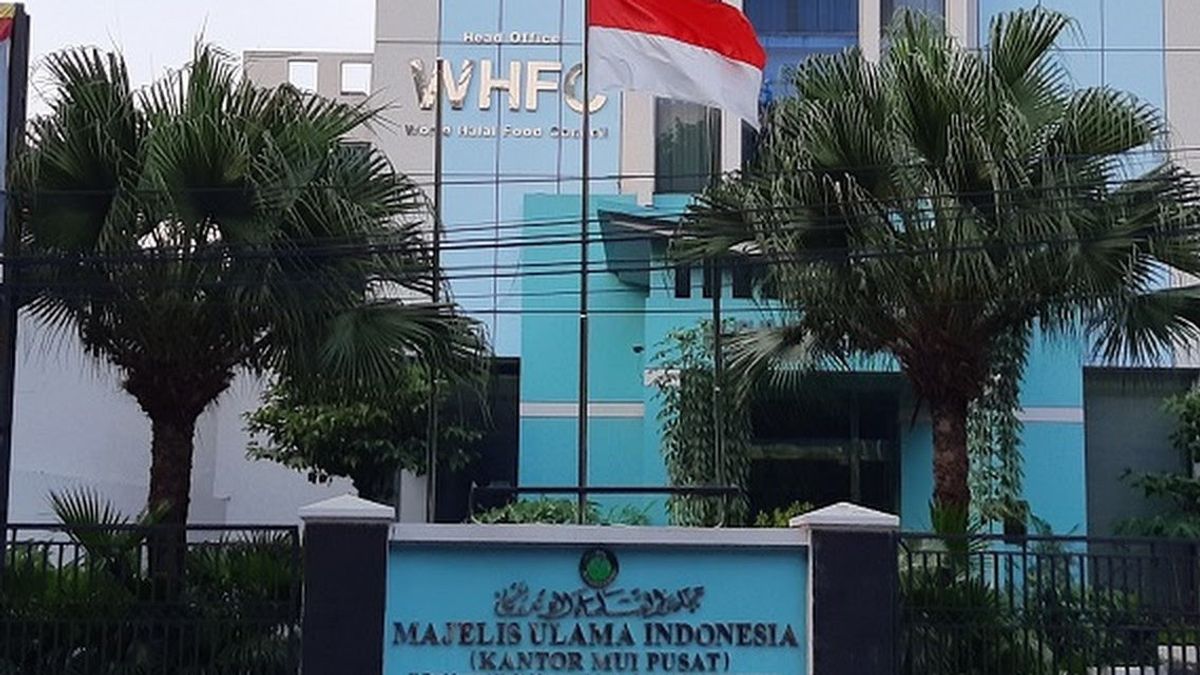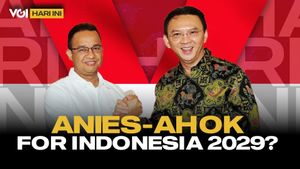JAKARTA - The arrest of three suspected terrorists in Bekasi on November 16 had a long tail. One of the growing issues is the emergence of the hashtag #bubarkanMUI. So what happens when that happens?
Densus 88 Anti-terror arrested three suspected terrorists who are said to be involved in the Jamaah Islamiyah (JI) network. The three are Chairman of the Indonesian People's Da'wah Party (PDRI), Farid Okbah, Ustaz who graduated from Al-Azhar University Cairo-Egypt, Anung Al-Hamat, and member of the Fatwa Commission of the Indonesian Ulema Council (MUI), Ahmad Zain An-Najah. After the arrest, the narrative of dissolving MUI emerged.
As is known, Densus 88 arrested a member of the MUI Fatwa Commission, Zain An-Najah in the Bekasi area of West Java, Tuesday, November 16. The police said Zain was a member of the Shura Council in the JI terrorist network and also the chairman of the Sharia Board of the Baitul Maal Amil Zakat Institution Abdurrahman Bin Auf (LAZ BM ABA) or a charity foundation established to fund JI.
The general chairman of the MUI, Miftachul Akhyar, in his statement on Wednesday, November 17, said that the alleged involvement of terrorists among its members was a personal matter and had nothing to do with MUI. "The alleged involvement in the terrorist network movement is a personal matter and has nothing to do with the MUI," he said.
Therefore, the person who is often called Kiai Miftah handed over the legal process to the Police. However, MUI requested that in the process of handling this case, the principle of presumption of innocence should be prioritized.
In addition, MUI also appealed to the public not to be provoked by the circulating issues. The legal process will continue according to the rules.
"MUI urges the public to refrain from being provoked by certain groups who take advantage of this situation for certain interests," said Akhyar.

Disbandment urge
The incident of Zain's arrest had a long tail. To the extent that there was an impetus for the dissolution of MUI in the public sphere. On Twitter, the hashtag #bubarkanMUI was trending.
The @Tonga_Nixon account is the one that enlivened the hashtag #BubarkanMUI. "The Indonesian Ulema Council is involved in terrorism, remember guys, 'OKNUM' the Indonesian Ulema Council. Let's help Up #BubarkanMUI because it is time to dissolve it.
Individuals from the Indonesian Ulema Council are involved in terrorism, remember, guys, "OKNUM" the Indonesian Ulema Council, Let's help Up#Dissolve the MUI because it's time for it to be disbanded
— The Voice of the Heart (@Tonga__Nixon) November 16, 2021
In addition there is an account @riverfide with a similar tone. "It is appropriate that Densus 88 arrest Anwar Abbas and immediately #disband MUI."
However, netizens seem to be divided. Some netizens competed with the hashtag #bubarkanMUI by enlivening the hashtag #supportMUI.
One of the accounts that enliven the hashtag #supportMUI is Hilmi Firdausi. The caretaker of the Baitul Qur'an Assa'adah Islamic Boarding School said that if indeed at MUI there were indications of terrorism, just prove it legally, not by voicing the disbandment of MUI.
"If there are indications of terrorism at the MUI, just prove it legally... Not by voicing the disbandment of the MUI which has been established since 1975 and has done great service to the ummah with its fatwas as references," he wrote.
If there are indications of terrorism at MUI, just prove it by law. I heard that the person concerned has also been disabled. Not by voicing the disbandment of MUI, which has been established since 1975 and has made great contributions to the ummah with its fatwas that serve as references. Bismillah, let's enliven the hashtag: #supportMUI#kamibersamaMUI
— Hilmi Firdausi (@Hilmi28) November 17, 2021
MUI Functions
As quoted from the mui.or.id page, MUI is a place for deliberation for Muslim scholars and scholars in Indonesia. The goal is to guide, foster and protect Muslims throughout Indonesia. This organization was founded in the era of President Soeharto, on July 26, 1975 in Jakarta.
MUI itself was established as a result of a meeting or deliberation of scholars and scholars from various parts of the country. The founders consisted of 10 ulama from central Islamic organizations, namely NU, Muhammadiyah, Syarikat Islam, Perti. Al Washliyah, Math'laul Anwar, GUPPI, PTDI, DMI and Al Ittihadiyyah. In addition there are 4 scholars from Indas Rohani Islam, Army, Air Force, Navy and POLRI. Also, 13 scholars who are individual figures.
"From the deliberation, the result was an agreement to form a forum for deliberations for the ulama, zuama and Muslim scholars. Then it was stated in a "Certificate of Establishment of the MUI," which was signed by all the participants of the deliberation, which was later called the 1st National Conference of Ulama," it was written.
As a forum for deliberation for Muslim scholars and scholars, MUI functions to provide guidance and guidance to Indonesian Muslims in realizing religious and social life. Then provide advice and fatwas regarding religious and social issues to the government and society.
In addition, the functions of the MUI are also to increase ukhwah Islamiyah and inter-religious harmony, become a liaison between the ulama and the government as well as a reciprocal interpreter between the people and the government in order to succeed in national development. As well as increasing cooperative relations between organizations, Islamic institutions and Muslim scholars in providing guidance and guidance to the community, especially Muslims by holding mutual consultations and information.
What if it was disbanded?
A public policy observer from Trisakti University Trubus Rahadiansyah believes that dissolving MUI is not an easy matter. The problem, said Trubus, is what institution can oversee vital functions related to Islam if not the MUI.
"And the problem is if it is possible to dissolve it, the question is what institution can oversee vital functions related to Islam. Because the problem is that many people use the label of Islam for the purposes of their own sects. Now this is where the control function of the MUI runs," Trubus told VOI.
Because so far, according to Trubus, there are sects that act in the name of Islam but deviate from the teachings. "Don't pray, don't fast. This is where the role of the MUI is to control. Otherwise, this can run rampant in the community."
In addition, another problem that can arise if MUI is dissolved is related to the issue of fatwas. "Later, the institutions may be able to run independently. Now this MUI fatwa minimizes public uncertainty. For example, regarding vaccines."
Trubus is of the opinion that MUI actually has no problem organizationally. It's just that he sees a lot of homework that needs to be done in terms of human resources.
"As far as I know, the MUI exists in order to guard the people. But often the human resources have problems in issuing statements," Trubus said.
*Read other information about MUI or read other interesting articles from Ramdan Febrian Arifin.
Other BERNASThe English, Chinese, Japanese, Arabic, and French versions are automatically generated by the AI. So there may still be inaccuracies in translating, please always see Indonesian as our main language. (system supported by DigitalSiber.id)













